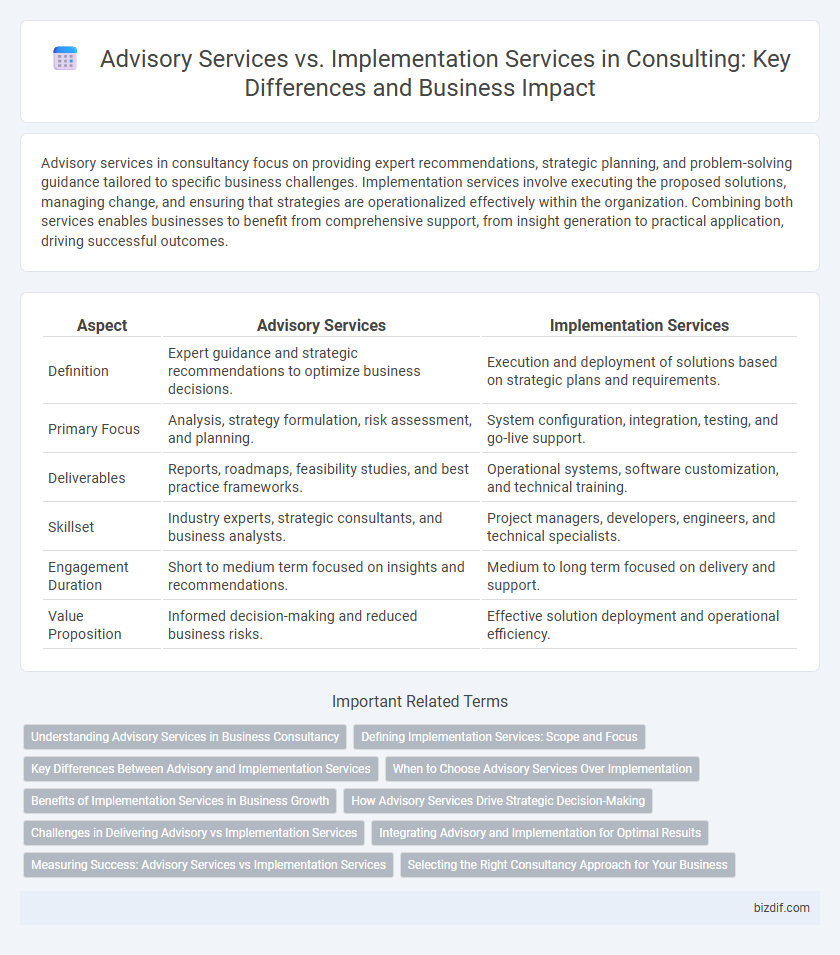Advisory services in consultancy focus on providing expert recommendations, strategic planning, and problem-solving guidance tailored to specific business challenges. Implementation services involve executing the proposed solutions, managing change, and ensuring that strategies are operationalized effectively within the organization. Combining both services enables businesses to benefit from comprehensive support, from insight generation to practical application, driving successful outcomes.
Table of Comparison
| Aspect | Advisory Services | Implementation Services |
|---|---|---|
| Definition | Expert guidance and strategic recommendations to optimize business decisions. | Execution and deployment of solutions based on strategic plans and requirements. |
| Primary Focus | Analysis, strategy formulation, risk assessment, and planning. | System configuration, integration, testing, and go-live support. |
| Deliverables | Reports, roadmaps, feasibility studies, and best practice frameworks. | Operational systems, software customization, and technical training. |
| Skillset | Industry experts, strategic consultants, and business analysts. | Project managers, developers, engineers, and technical specialists. |
| Engagement Duration | Short to medium term focused on insights and recommendations. | Medium to long term focused on delivery and support. |
| Value Proposition | Informed decision-making and reduced business risks. | Effective solution deployment and operational efficiency. |
Understanding Advisory Services in Business Consultancy
Advisory services in business consultancy focus on delivering expert insights, strategic planning, and tailored recommendations to help organizations identify opportunities, mitigate risks, and optimize operations. These services emphasize diagnosis and guidance without direct execution, enabling clients to make informed decisions. Unlike implementation services, advisory engagements prioritize knowledge transfer and empowerment of internal teams to sustain long-term growth.
Defining Implementation Services: Scope and Focus
Implementation services encompass the practical application of strategic plans, focusing on executing solutions tailored to client needs, including project management, system integration, and process optimization. These services ensure that recommendations provided during advisory phases are effectively realized through coordinated activities, resource allocation, and performance monitoring. The scope of implementation services covers deployment, change management, and continuous support to achieve measurable business outcomes aligned with client objectives.
Key Differences Between Advisory and Implementation Services
Advisory services focus on strategic guidance, analysis, and recommendations to help organizations identify challenges and opportunities, while implementation services concentrate on executing these strategies through tangible project management and operational support. Key differences include the scope of involvement, with advisory services being more consultative and long-term, compared to the hands-on, short-term delivery focus of implementation services. The success metrics also differ, as advisory measures impact through informed decision-making, whereas implementation evaluates results based on achieved outcomes and project completion.
When to Choose Advisory Services Over Implementation
Advisory services are ideal when organizations require expert guidance to develop strategies, assess risks, or understand complex industry regulations without immediate operational changes. Choosing advisory services is preferable during the initial decision-making phase to evaluate options and create a clear roadmap before committing resources to execution. This approach enables informed planning, risk mitigation, and alignment with long-term business goals without the need for direct implementation involvement.
Benefits of Implementation Services in Business Growth
Implementation services drive business growth by transforming strategic plans into actionable results, ensuring seamless execution and measurable outcomes. These services optimize resource allocation, enhance operational efficiency, and accelerate time-to-market for new initiatives. Leveraging expert project management and technology integration, implementation services reduce risks and enable scalable growth for competitive advantage.
How Advisory Services Drive Strategic Decision-Making
Advisory services provide critical insights and data-driven analysis that shape strategic decision-making by identifying business opportunities and risks. These services enable organizations to align their goals with market trends and regulatory requirements, ensuring well-informed, forward-looking strategies. Implementation services, in contrast, focus on executing these strategies, translating advisory recommendations into tangible operational outcomes.
Challenges in Delivering Advisory vs Implementation Services
Advisory services face challenges in translating strategic recommendations into actionable plans, often encountering resistance due to limited client buy-in and unclear execution frameworks. Implementation services confront operational hurdles such as resource allocation, technology integration, and adapting to dynamic client environments while maintaining project timelines. Both require seamless communication and alignment between consulting teams and client stakeholders to ensure successful outcomes.
Integrating Advisory and Implementation for Optimal Results
Advisory services provide strategic insights and tailored recommendations that identify key opportunities and risks within business processes. Implementation services execute these strategies through practical solutions, ensuring that planned changes deliver measurable improvements. Integrating advisory and implementation bridges the gap between vision and action, enabling organizations to achieve optimal results by aligning expert guidance with effective execution.
Measuring Success: Advisory Services vs Implementation Services
Measuring success in advisory services primarily relies on qualitative outcomes such as strategic alignment, decision-making effectiveness, and long-term value realization, often tracked through key performance indicators (KPIs) like client satisfaction and actionable insights delivered. In contrast, implementation services focus on tangible, quantifiable results including project completion rates, system functionality, time-to-deploy, and return on investment (ROI), emphasizing operational efficiency and adherence to scope. Both service types require distinct evaluation frameworks, where advisory measuring success centers on guidance impact and implementation on execution performance.
Selecting the Right Consultancy Approach for Your Business
Selecting the right consultancy approach for your business hinges on understanding the distinction between advisory services, which provide strategic insights and expert recommendations, and implementation services, which focus on executing and managing those strategies. Advisory services are ideal for businesses seeking guidance to design frameworks, whereas implementation services suit organizations that need hands-on support to deploy solutions effectively. Evaluating your company's current capabilities, project scope, and desired level of involvement ensures the optimal consultancy engagement that drives measurable results and sustainable growth.
Advisory services vs Implementation services Infographic

 bizdif.com
bizdif.com